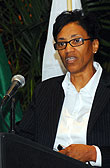| Source: Date: Updated: |
TheBahamasInvestor.com
Sunday, March 20, 2011 Sunday, March 20, 2011 |
“It is important to establish a strong culture of compliance at the top of a financial institute, but at the end of the day, it is everybody’s responsibility,” according to the governor of The Central Bank of The Bahamas, Wendy Craigg.
Craigg was addressing the issue of “Accountability and Trust: a Regulatory Perspective” at the 19th World Conference of Banking Institutes being held at Atlantis Paradise Island March 20-23.
The international conference is being hosted by The Bahamas Institute of Financial Services (BIFS) and has attracted more than 100 delegates from all around the world.
“Trust and accountability are two words that resonate with financial regulators. They are a critical ingredient in maintaining a sound financial system and a robust economy,” said the governor.
Craigg went on to say that regulators play a key role in sound corporate governance by providing guidance; evaluating implementation; assessing quality control; discussing findings with the board of directors and senior management; and ensuring effective communication with different regulatory entities.
To this end, the Central Bank of The Bahamas has been working to aid compliance measures in line with the Organisation of Economic Co-operation and Development (OECD) and accords on banking laws and regulations issued by the Basel Committee on Banking Supervision.
“The latest economic crisis exposed lapses in the sector in key areas–a lack of engagement, understanding and communication,” said governor Craigg. “The focus since has been to broadened the assessment of these entities and to see the extent to which an institution is exposed to risk.”
Craigg added that the Central Bank had established a new committee to look at macroprudential assessment on a broad basis and said that the bank, like all regulators, now goes through a consultative process to review and update guidelines, “which are relevant for the industry and, if adhered to, create a safer environment.”
The Central Bank governor, however, emphasized the importance of an ethical approach by industry players, beyond the role of the regulator. “One of the things that came out of the last crisis was that regulation already existed, but it was never implemented, so ultimately it depends on the individual,” said Craigg. “Training helps to ingrain the culture of sound governance, but ethics are so important and you must be wedded to the principles. You can have very good, documented procedures, but if they are not implemented, then they are meaningless.”











